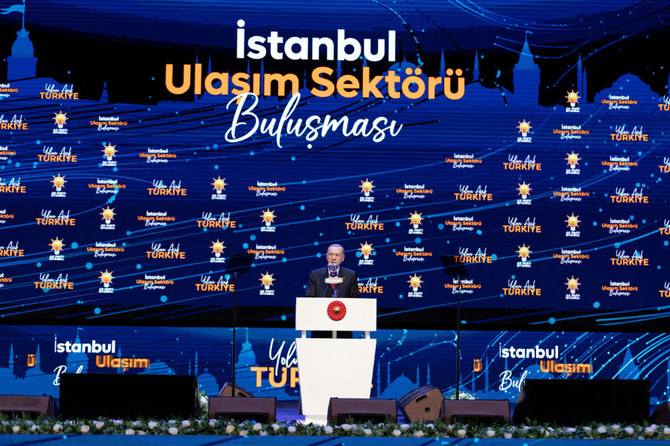How ‘us’ versus ‘the other’ took center stage in Turkish elections
How ‘us’ versus ‘the other’ took center stage in Turkish elections

Echoes from last week’s historic elections in Turkiye will continue to be heard. It was the second time in its history that the country held presidential and parliamentary elections at the same time, the first being in 2018, and domestic turnout reached about 88 percent. The elections were dubbed “the most important elections of 2023” by major media outlets.
Neither President Recep Tayyip Erdoğan nor opposition leader Kemal Kılıçdaroğlu secure the 50 percent needed for outright victory, so there will be a second round run-offon May 28. Erdoğan won 49.5 percent, Kılıçdaroğlu won 44.9 percent. The third candidate, nationalist Sinan Oğan, obtained 5.17 percent and the two remaining candidates are expected to seek his endorsement in negotiations this week.
Undoubtedly, Oğan’s increasing importance in the Turkish political scene leading up to the critical runoff has accelerated the nationalist/populist tone in both camps, which turned the focus on the nationalist voters who are likely to shape the outcome of the second round. Both presidential rivals have alliances with nationalist parties. While Erdoğan has an alliance with the ultranationalist Nationalist Action Party as his main coalition partner, Kılıçdaroğlu’s alliance includes the nationalist Good Party. The presence of Turkish nationalists at the center of the two main alliances that fought the elections has paved the way for nationalist/populist rhetoric to have greater effect on both sides’ arguments.
Nationalism, which has been on the rise globally since US President Donald Trump’s term, is critically important for the competing alliances now. Populist/nationalist parties benefit when the salience of socio-cultural issues, such as migration and national identity, is high. Populism relies on leaders who feed the people’s will by mobilizing anger, hope, belief, and faith at the grassroots level. For populists, nationalism becomes the most important tool in hand. As an electoral strategy and political logic, it has been used to respond to political grievances, and hence to gain political authority.
Although populism as a mode of political articulation is largely attributed to right-wing political parties in Turkiye, interestingly, it started to gain a stronger presence in the left-wing camp as well. Within this context, the rise of nationalist figures in the Turkish political landscape — as well as in both alliances — have made the issue of the presence of Syrians in Turkiye the top issue on the agenda, ahead of any other problem such as the economy, women’s rights, or unemployment.
Kılıçdaroğlu last week made a pitch for nationalist voters ahead of a second round of voting, and criticized the government for allowing an alleged “10 million irregular migrants” into the country. The almost four million Syrians in Turkiye have, in particular, been a target of xenophobic rhetoric across the political divide in recent years. Having said this, it became clear that the next round of the presidential election is to be based on anti-migrant or refugee sentiment, a topic that has long polarized Turkish society.
Oğan’s increasing importance in the Turkish political scene leading up to the critical runoff has accelerated the nationalist/populist tone in both camps.
Sinem Cengiz
Turkish political figures have for so long relied on the notion of “us” versus “the other.” That “other” varied from Arabs to Kurds, from Alevis to Islamists, at different times. Refugees and migrants are an easy, visible “other” seeming to fall neatly into the “us” versus “them” framework of ethno-nationalism.
In the US, politicians used to engage in what the legal scholar Ian Haney-Lopez called “blowing a dog whistle” when referencing “other”, instead of saying “those Mexicans” or whatever. In Turkiye, “those Syrians” have, unfortunately, become the clear reference for “the other”.
Within this context, not only has society been polarized with the notion of “us” versus “the other,” but the country’s domestic and foreign politics also took a more nationalist turn. In the past, foreign policy did not get a lot of attention in elections; however, as Turkiye started to play a greater role in international and regional politics, the Turkish public started to take a more serious interest in their country’s record on foreign policy issues. In the past decade, Turkiye has become more nationalist, and its foreign policy has been militarized. The roots of ruling alliance’s assertiveness abroad lie in the domestic alliances they made at home.
Indeed, considerably rapid changes in Turkish society due to regional challenges caused anxiety and disturbance, bringing several social and economic issues to the forefront. However, although populism, ethno-nationalism and securitization might bring votes in the short term, they definitely threaten the social fabric of a country in the long term. The language being used by politicians not only increases the culture of fear among people toward the perceived “other” but it also creates a process of exclusion and polarization. This is indeed a threat to all the things a country or a nation values.
Whether ongoing ethno-nationalist and populist rhetoric will hold when Turks return to the polls remains to be seen. The first task for whoever leads Turkiye should be avoiding the culture of us-versus-other in society for a better integrated country.
• Sinem Cengiz is a Turkish political analyst who specializes in Turkiye’s relations with the Middle East. Twitter: @SinemCngz
Disclaimer: Views expressed by writers in this section are their own and do not necessarily reflect Arab News’ point of view


